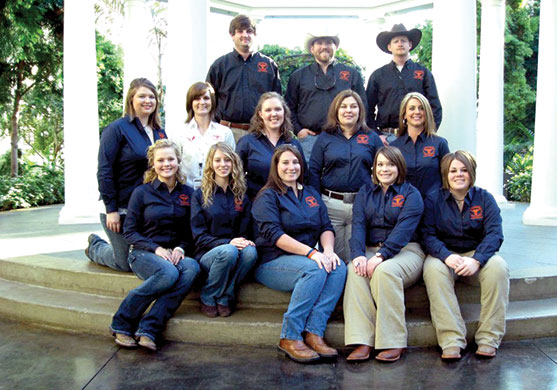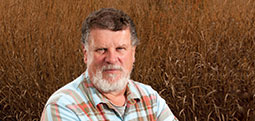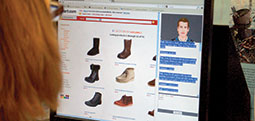| Current Issue | Past Issues | Subscribe | Ag Homepage |

At Your Service
by
For even the most experienced cook, feeding several hundred people at one time would be a daunting task. But for members of Auburn’s Collegiate Cattlemen and Cattlewomen, catering meals has become a regular occurrence and is proving to be a significant source of income to support the organization’s activities and goals.
“Since August, we have served about 15 events, from a 10-person York Lecture dinner to 750 people at Ag Discovery Adventure,” says Carla Weissend, animal sciences/pre-vet senior and current president of Collegiate Cattlemen and Cattlewomen.
Sophomore animal sciences major Autumn Brown is vice president of catering and, as such plans and organizes each job.
“The catering is a whole category by itself,” says Brown. “There are so many things you have to think about. It really is like running a business.”
Students are in charge of processing, cutting and cooking the meat and of preparing side dishes and buying supplies for each catered event. Barbecue pork, cheeseburgers, macaroni and cheese and potato salad are some of the more popular items on their menu, but Weissend says they can serve just about anything, from a plated meal of prime rib, risotto and grilled asparagus to a whole hog tailgate.
Training is provided to students before taking part in any food process along the way.
“It is a good learning experience, because there are safety guidelines you have to follow,” says Christy Bratcher, animal sciences assistant professor and club adviser since 2008.
As adviser, Bratcher has guided the Collegiate Cattlemen and Cattlewomen through a major transition that began in 2011 when the club changed its name from the Meat Science Association to Collegiate Cattlemen and Cattlewomen in an effort to better fit the interests of Auburn agriculture students and to attract new members.
“Meat Science Association is just not an attractive name,” Bratcher says.
The name change was effective, and Weissend is proof. The new name encouraged her to join.
“I was a Junior Cattleman,” she says, referring to a partner organization of the Alabama Cattlemen’s Association, “and I want to be an Alabama Cattleman one day, so I realized this was my way to bridge the two.”
With the new name, the organization grew from 10 members to 39 members. With this growth, Bratcher and officers of the Collegiate Cattlemen and Cattlewomen realized the catering business needed to grow as well.
Staci Degeer, one of Bratcher’s Ph.D. students, spent countless hours developing a streamlined business model and researching other catering options in the area to ensure competitive pricing. With that done, Bratcher encouraged the Collegiate Cattlemen and Cattlewomen to expand the business by taking on more events.
“It’s good to work with anyone because if you do a small event, that may lead to a bigger event in the future,” Bratcher says. “Word gets around.”
In fact, word of the versatility and work ethic of Collegiate Cattlemen and Cattlewomen has gotten around. Weissend remembers a week where the club had eight catering events in 10 days. “I put it out to the club asking for their help,” said Weissend, “and the club stepped up to the challenge. We had more than enough people to cover each event.”
Catering gives the members of Collegiate Cattlemen and Cattlewomen experience in meat processing, event planning, budgeting and working with a team. But there’s more to it than the work experience.
“Catering events provide you an opportunity to bond,” Weissend says. “You are working, but you are having fun and making memories.”
The purpose of the business is not only to gain experience and make memories, but also to raise funds for travel to beef industry events. In spring semester 2012, 10 Collegiate Cattlemen and Cattlewomen traveled to the National Cattlemen’s Beef Association Convention in Nashville, Tenn., using catering funds and sponsorships from the Alabama Cattlemen and Cattlewomen.
The benefits of attending the convention are both educational and professional. Brown, who had joined the organization only weeks before the 2012 convention, can attest to that.
“We sat through lectures and guest speakers about the beef industry in the morning, and then we had socials to meet professionals in the beef industry,” she says. “It was my favorite trip.”
The 2013 National Cattlemen’s convention is in Tampa, Fla., in February, and Bratcher hopes to increase the size of Auburn’s delegation. With that goal in mind, the club has stepped up its fundraising efforts, including the catering, to help reduce club members’ out-of-pocket costs for the trip. In years past, the organization raised about $6,000 a year. This year, from August to October alone and from catering alone, the organization brought in more than $6,000, making this its biggest year to date. The organization also has a website, where T-shirts, license plates and holiday sausage boxes can be purchased.
As the club continues to grow and develop, members, such as Brown, have grown as individuals as well.
“Cattlemen’s has helped me see that event planning is something I want to do, rather than researching,” she says.
The future is bright for Auburn’s Collegiate Cattlemen and Cattlewomen, as Bratcher, Weissend and Brown agree they want to see the organization and its catering continue to grow. Weissend put her vision for the club simply.
“Whether you come from a cattle background, or you want to know more about the meat you eat, or you’re interested in the cattle industry—we don’t care, we want you there.”
For more information on the organization, go to their website www. auburn.edu/student_info/cattlemen/ or contact Christy Bratcher at clb0012@auburn.edu.








